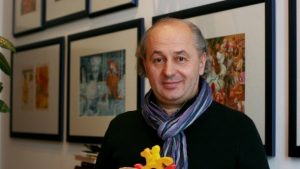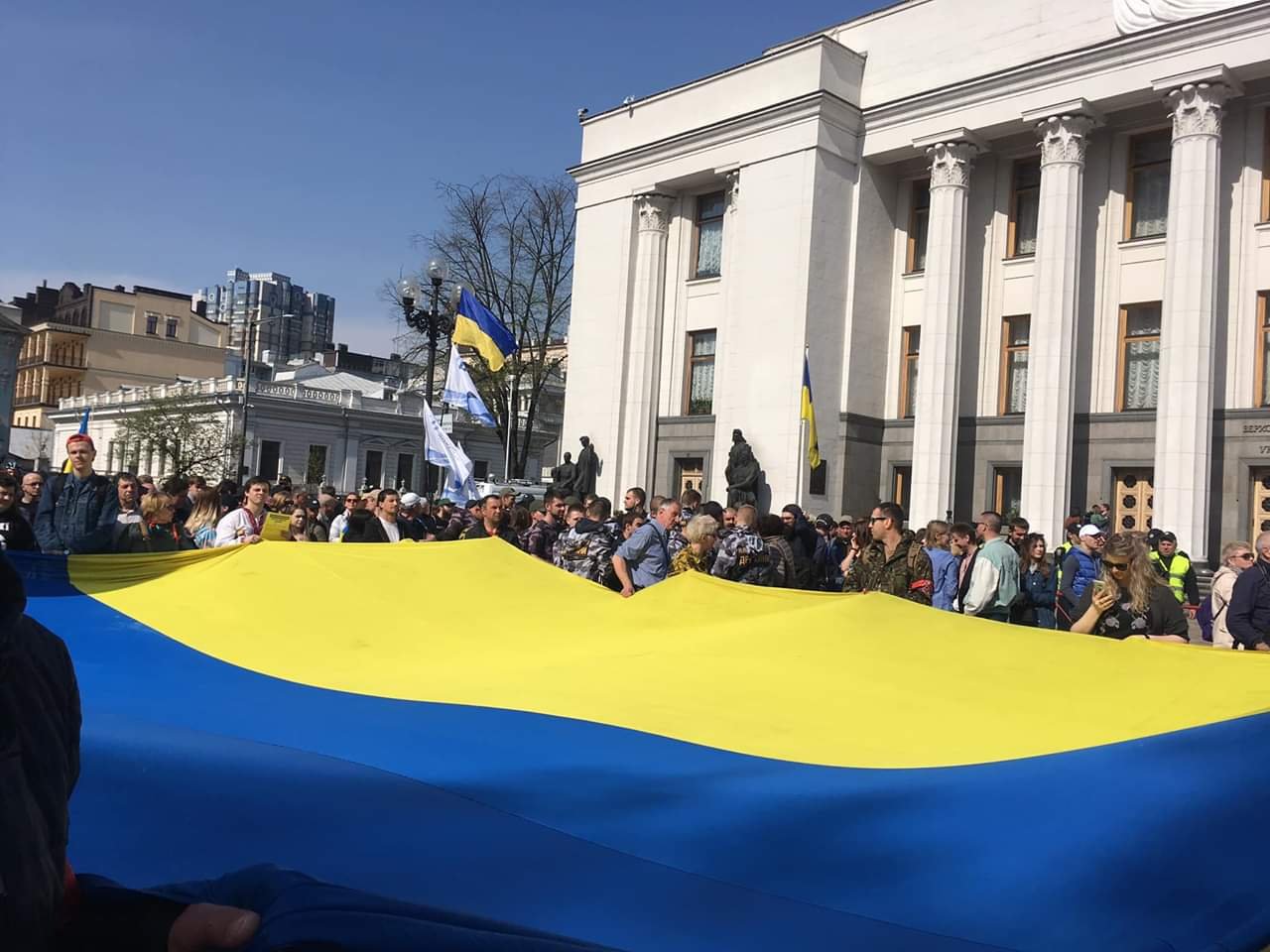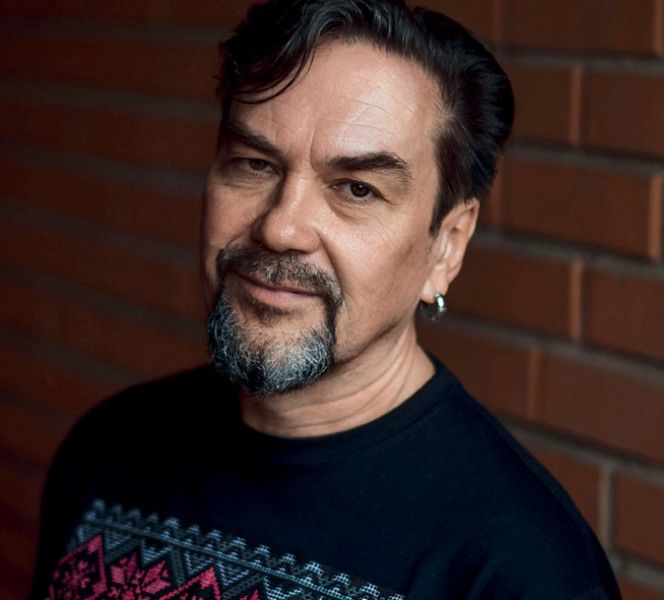Ukrainians have been defending their native language since the 15th century, often suffering and dying for the right to speak, write and compose in Ukrainian. The chronology of Ukrainian language suppression is several pages long, and echoes with the sound of executions, suffering and torture.
By order of Moscow tsar Mikhail I, all copies of the Instructive Gospels by Kyryl Stavrovetsky were destroyed in 1627. Ukrainian texts were removed from all church books; it was prohibited to publish anything in Ukrainian. Under the reign of Catherine II, it was forbidden to teach anything in Ukrainian, even at the Kyiv-Mohyla Academy.
During the Soviet period in the Ukrainian SSR, teachers of Russian were paid more than their colleagues of Ukrainian.
The ruling authorities were afraid of the Ukrainian language; Ukrainian was banned not only by the Russian Empire, but also by Lithuanians, Poles, Romanians, and Hungarians – all of whom temporarily conquered and ruled parts of Ukraine. The Ukrainian language has survived over a hundred acts of linguicide (conscious destruction of language as the main feature of an ethnic group-Ed.).

Today, it’s the 21st century, and Ukraine is again at war. And once again, Ukrainians are fighting for their language, their culture and their country. Why is the language issue so important even in this day and age? Why do so many Ukrainians prefer to ignore the Ukrainian language?
Prominent Ukrainian writer and publisher Ivan Malkovych talks about language as a marker of national identity, about bilingualism and war, and examples of language policies in neighbouring countries.
Today, we hear more and more Ukrainian in the streets of Kyiv. Do you still feel like a foreigner in your own country?
Language is something that unites people and makes a nation strong. It’s the most important marker of national identity. Unfortunately, we still don’t have a law that protects the right of every Ukrainian to receive information and services in the Ukrainian language - from stores and public institutions to glossy magazines, radio stations and television. Signs written in the language of the aggressor should be reduced to a bare minimum.
One day during the Second World War, Churchill was discussing the budget with his officials, who wanted to cut funding for culture in favour of the army. Churchill looked at them in astonishment and said: “What then, shall we defend?”
We must understand that everything will work out when the Ukrainian language is heard everywhere. Perhaps I’m a utopian, but this opinion is increasingly expressed in our information space. If Ukrainian prevails in our country, then we’ll have some semblance of order, and if not, some sort of “putin figure” will always be around, no matter what he’s called.
The flag, coat of arms and even borders may change, but not the language. Let’s listen to what Lesia Ukrayinka says, quoting the words of Irish activist Thomas Davis:
“A people without a language of its own is only half a nation. A nation should guard its language more than its territories – ‘tis a surer barrier and more important frontier, than fortress or river... To lose your native tongue, and learn that of an alien, is the worst badge of conquest. To have lost entirely the national language is death... the fetter has worn through.”
It’s important to be brought up on the same lullabies, verses and stories, on the same traditions, as it is done in most countries. Only then will we cease to exist as two streams running parallel to one another, but never intersecting.
Once, I spoke jokingly with the classmates of my eldest son Taras (he was then in the first or second grade). But, only my son laughed at my jokes. The other children didn’t understand what I was talking about because they hadn’t read the Ukrainian translation of Astrid Lindgren’s Karlsson-on-the-Roof*, where there’s a character called “панна Цап” (Miss Goat). They were familiar with a figure called Freken Bock from the Russian cartoon of the same name. You see, even translated books should be read in our language…so that we might better understand each other.
(*Karlsson-on-the-Roof is a character who figures in a series of children’s books by the Swedish author Astrid Lindgren. A cartoon adaptation of the series became popular throughout the Soviet Union when it was released in the 1970s. These adaptations are still celebrated as an integral part of the Russian cartoon industry. Karlsson, together with Cheburashka and other such characters are recognized as national icons in Russia and the ex-soviet space-Ed.)
However, I’m happy to say I hear more and more Ukrainian in Kyiv, and mostly from young people. That really makes me feel more optimistic because they’re our future.
Ukrainians probably don’t read a lot in Ukrainian. Do you know where in Ukraine people read mostly in Ukrainian?
Yes, it’s mostly in Kyiv and Lviv. Of course, all over Ukraine…from Ternopil to Odesa, from Kharkiv and Dnipro to Ivano-Frankivsk and Zhytomyr. Lviv is a fantastic city of bookstores. Donetsk and Luhansk regions aren’t big on reading, even in Russian. I assume that it’s namely due to this lack of culture that these regions are currently in this war situation. People also read quite a lot in Bukovyna, as well as in Mykolayiv and Kherson.

You know, the Japanese read five to six times more books than we do. We saw this when we compared the sales of such bestsellers as the Harry Potter series and books by Roald Dahl. But, I should underline that Ukrainian publishers are gradually becoming economically stronger and the number of people reading Ukrainian books is growing.
I think one of the reasons for the lack of interest in Ukrainian books is widespread poverty and a weak cultural policy. The state should promote books, reading and national publishing companies, as it’s been done in most forward-looking countries.
In addition, Ukraine is the biggest country in Europe and has the fifth/sixth largest population, but it still doesn’t have a paper production industry. So, we have to buy paper at an astronomical price in European countries, which, in turn, purchase Ukrainian timber at very low prices. This greatly affects the pricing policy of our publishing houses, which earn pittance on book sales. Books are very cheap in Ukraine; only India has cheaper publications, while even China sells books at a much higher price. Another important issue is that Ukrainian salaries are miserably low...
What should be done to make Ukrainians proud of their language?
Well… not only must the Ukrainian language be protected under a strict language law and quotas, but it should also be popularized and promoted. How? Celebrities, prominent cultural and sports figures should do it. Of course, we shouldn’t resort to radical methods of Magyarization* as it once used to be in Hungary, for example. I recently visited Budapest and was shocked by stories about former methods used to “influence” people who didn’t speak Hungarian. However, we see that today there are no alternatives to Hungarian in Hungary. We also see how determined they are to protect their language in Ukraine.
(*Magyarization - the term specifically applies to the policies that were enforced in the Hungarian part of Austria-Hungary in the 19th and early 20th century, especially after the Austro-Hungarian Compromise of 1867.
When referring to personal and geographic names, Magyarization refers to the replacement of a non-Hungarian name with a Hungarian one.
As is often the case with policies intended to forge or bolster national identity in a state, Magyarization was perceived by other ethnic groups, such as the Romanians, Slovaks, Ukrainians, Serbs, Croats, etc., as aggression or active discrimination, especially where they formed the majority of the population-Ed.)
If you remember, about a hundred years ago Mykola Kulish wrote a remarkable play called Myna Mazaylo. One of the main protagonists is called “тьотя Мотя” (auntie Motia), whose words still resonate in Ukrainian society: “Лучше быть изнасилованной, чем украинизированной!” (It’s better to be raped than to become Ukrainianized!). A century has gone by, and yet these auntie Motias are still with us!
You know, Hetman Pavlo Skoropadsky* governed Ukraine for only seven and a half months. In this short period of time, more than 50 public high schools were opened. The number of periodicals increased to 255. The study of the Ukrainian language and literature was enshrined in law. Skoropadsky’s most outstanding achievement in the education and academic field was the foundation of the Ukrainian Academy of Sciences, presided by Volodymyr Vernadsky.
(*On April 29, 1918, a coup d’état toppled the Ukrainian People’s Republic (UNR) and Petro Skoropadsky became Hetman of Ukraine. By contrast with the earlier socialist Rada, his government was credited for creating an effective administrative organization, establishing diplomatic ties with many countries, concluding a peace treaty with Soviet Russia, and building many schools and universities-Ed.)
Here’s another example in our turbulent history. The UNR Directorate didn’t have much money, but they did manage to finance the Ukrainian Republican Cappella, which was led by well-known conductor and composer Oleksandr Koshyts. Thanks to numerous tours and remarkable performances, Ukrainian music and songs became very popular in the USA and Western Europe. It was during those years that the world first heard Mykola Leontovych’s Shchedryk (Carol of the Bells). Only by promoting our cultural heritage will we finally appear on the world map… because people everywhere love and respect culture. But, today, Ukraine is just a subject of general global pity…
Recently, speaking to the winners of the Petro Jacyk International Ukrainian Language Competition, I said that Ukrainians, who love and understand the significance of the Ukrainian language, must become rich and successful. Petro Jacyk was a successful Ukrainian-Canadian businessman and philanthropist who started as a construction worker and built an empire. In 1986, he established the Petro Jacyk Education Foundation, which promotes the Ukrainian language and Ukrainian studies. Unfortunately, Ukrainian is not popularized by our wealthy elite. Our oligarchs (with rare exceptions) don’t speak Ukrainian, so how can we say anything about their national consciousness?
You once said that the best vaccine “against the northern plague” is to include the Battle of Kruty in the curriculum of all high schools and higher educational institutions in Ukraine. Do Ukrainians deliberately refuse such vaccines?
It’s very important for young people to learn about Ukraine’s victories, and not just our tragedies and defeats. We’ve got to stop playing the victim and finally talk about Ukrainian achievements.
You probably know that Ukraine is among the top ten space powers in the world. Traditionally, all the achievements of Soviet astronautics have been attributed to Russia. But, very few people know about today’s achievements in Ukraine. A few years ago, we published the Ukrainian Space Encyclopedia that recounts the significant contributions of so many Ukrainians* to space research.
We have something to be proud of and we should know about it.
(*20 Ukrainians are listed among the famous developers of rocket and space technology. The founder of practical cosmonautics Serhiy Koroliov was Ukrainian, and when Ukrainian astronaut Pavlo Popovych was launched into space, he sang Koroliov’s favourite Ukrainian song – “Дивлюся на небо та й думку гадаю” (I look at the sky and I wonder)-Ed.).
As for the heroic Battle of Kruty, it’s a shining example of courage and patriotism for our young people. Tabachnyk’s* people were well aware of this when they came to power, and so, the Battle of Kruty was mentioned in just two short lines in school textbooks.
(Dmytro Tabachnyk is a Ukrainian politician, and former education minister of Ukraine. Tabachnyk is among severalmformer Ukrainian officials who have had their assets frozen by the EU and is wanted in Ukraine for embezzlement and abuse of office.-Ed.)
Many Russian-speaking Ukrainians, often popular celebrities, say something like: “it really doesn’t matter which language I use; after all, some developed countries have two official languages and people make the best of it.” What would you like to say to these Ukrainians?
Look at how many have people died for the Ukrainian language! And look what’s happening today. Since 2014, people in Luhansk and Donetsk regions have been tortured or killed only because they were Ukrainians speaking Ukrainian. So, if we’re aware of this, can we really and truly say: “It’s all the same to me.” Today, we should all speak Ukrainian for the sake of those men and women who sacrificed their lives for our language.
You know, I don’ like imposing my views, but I advise all Ukrainians to read Yuriy Horlis-Horsky’s book – “Холодний яр” (Kholodny Yar), a most important books for, I’d say, “putting your self-identity in order”. This is a shining example of how a small number of men, but strong in spirit, were able to successfully fight an immeasurably stronger enemy. It’s also one of the greatest pages of Ukraine’s fight for independence, but it has yet to be adequately researched and explained, and therefore, has not yet become part of our national identity.
(*The Kholodny Yar Ukrainian partisan movement was an important part of the Ukrainian War of Independence (February 1917-November 1921). In today’s Chyhyryn Raion, this movement formed the Kholodny Yar Republic that lasted from 1919 to 1922, partisans fighting for Ukraine’s independence and against the Soviet Union. The republic was the last territory held by supporters of an independent Ukrainian state before the incorporation of Ukraine into the Soviet Union as the Ukrainian SSR. The partisan army marched under the blue-and-yellow flag of the UNR and the black flag of Kholodny Yar with the inscription “Воля України - або смерть!” (Freedom for Ukraine – or death!).
The Kholodny Republic flag was used during Euromaidan protests and by the Azov Battalion-Ed.).
It’s very curious that our enemies have always understood the importance of the Ukrainian language and have always been afraid of it, and we, Ukrainians, remain so frivolous and still don’t see any harm in communicating in Russian or Ukrainian.

Ivan Malkovych, born on May 10, 1961 in Nyzhniy Bereziv (Ivano-Frankivsk Oblast, is a noted Ukrainian writer, poet and publisher. He is the owner of the publishing house A-BA-BA-HA-LA-MA-HA, which specializes in high quality (often illustrated) editions of Ukrainian literature and poetry and has published Viktor Morozov’s wonderful translations of the Harry Potter series and books by Roald Dahl. His poems have been translated into English, German, Italian, Russian, Polish, Bengali, Lithuanian, Norwegian, Georgian, Slovak, and Slovenian.
Ivan Malkovych was awarded the National Taras Shevchenko Prize in March 9, 2017. In his speech, he spoke passionately on the pressing need for the government to support the law on the Ukrainian language as an important step on the way to national unity and state development of Ukraine.
In June, 2017, Ivan Malkovych and eighty other prominent political and cultural leaders signed an appeal to the Verkhovana Rada of Ukraine to pass draft law 5670-D designed to ensure full implementation of Article 10 of the Constitution of Ukraine on the state language of Ukraine.
On February 28, 2018, the Constitutional Court of Ukraine declared the Law “On Principles of State Language Policy” (the odious Kolesnichenko-Kivalov Law) unconstitutional due to the fact that the Verkhovna Rada has violated the procedure for its review and approval.
This decision was declared binding, final and cannot be appealed against.
Ukraine was in a language void since February although the Constitution provides for a language law.
On October 4, 2018, the Verkhovna Rada finally approved language law 5670-D with 261 Ayes, 26 Nays, 4 abstentions and 67 absentees.
Video of Ivan Malkovych’s speech at the Taras Shevchenko Awards ceremony, March 9, 2017 (in Ukrainian, 11 min)
[embedyt] https://www.youtube.com/watch?v=pY5GmIBLlTw[/embedyt]





